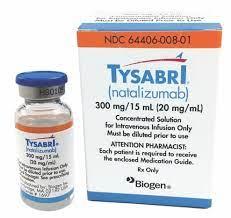Tysabri Disease Interactions
There are 4 disease interactions with Tysabri (natalizumab).
Immunosuppressive agents (applies to Tysabri) infections
Major Potential Hazard, Moderate plausibility. Applicable conditions: Infection - Bacterial/Fungal/Protozoal/Viral
Serious and sometimes fatal infections have been reported in patients receiving immunosuppressive agents. Patients receiving immunosuppressants are at increased risk of developing bacterial, viral, fungal, and protozoal infections, and new or reactivated viral infections including opportunistic infections. Caution should be exercised when considering their use in patients with severe or chronic infections. It is recommended to interrupt therapy in patients who develop a new infection while undergoing treatment and to monitor these patients closely for any sign or symptom indicative of infection.
Immunosuppressive agents (applies to Tysabri) PML
Major Potential Hazard, Moderate plausibility. Applicable conditions: Immunodeficiency
Immunosuppressive agents may increase the risk of progressive multifocal leukoencephalopathy (PML). Certain agents are contraindicated in patients who have or have had PML. Patients receiving chronic immunosuppressant or immunomodulatory therapy or who have systemic medical conditions resulting in significantly compromised immune system function should not be treated with these agents. Health care professionals should monitor patients for any new sign or symptom suggestive of PML. Therapy dosing should be withheld immediately and an appropriate diagnostic evaluation should be performed at the first sign or symptom suggestive of PML.
Natalizumab (applies to Tysabri) liver dysfunction
Moderate Potential Hazard, Moderate plausibility. Applicable conditions: Liver Disease
Postmarketing reports have associated the use of natalizumab with severe hepatic toxicity, including acute liver failure requiring transplant. Natalizumab should be discontinued in patients with jaundice or other evidence of significant liver injury and appropriate therapy should be instituted according to clinical guidelines.
Natalizumab (applies to Tysabri) meningitis
Moderate Potential Hazard, Moderate plausibility. Applicable conditions: Herpes Zoster Meningitis
Natalizumab increases the risk of developing encephalitis and meningitis caused by herpes simplex and varicella zoster viruses. It is recommended to monitor patients receiving natalizumab for signs and symptoms of meningitis and encephalitis. If herpes encephalitis or meningitis occurs, treatment should be discontinued, and appropriate treatment for herpes encephalitis/meningitis should be administered.
Switch to professional interaction data
Tysabri drug interactions
There are 414 drug interactions with Tysabri (natalizumab).
More about Tysabri (natalizumab)
- Tysabri consumer information
- Check interactions
- Compare alternatives
- Pricing & coupons
- Reviews (98)
- Drug images
- Side effects
- Dosage information
- Patient tips
- During pregnancy
- FDA approval history
- Drug class: selective immunosuppressants
- Breastfeeding
- En español
Related treatment guides
Drug Interaction Classification
| Highly clinically significant. Avoid combinations; the risk of the interaction outweighs the benefit. | |
| Moderately clinically significant. Usually avoid combinations; use it only under special circumstances. | |
| Minimally clinically significant. Minimize risk; assess risk and consider an alternative drug, take steps to circumvent the interaction risk and/or institute a monitoring plan. | |
| No interaction information available. |
Further information
Always consult your healthcare provider to ensure the information displayed on this page applies to your personal circumstances.


